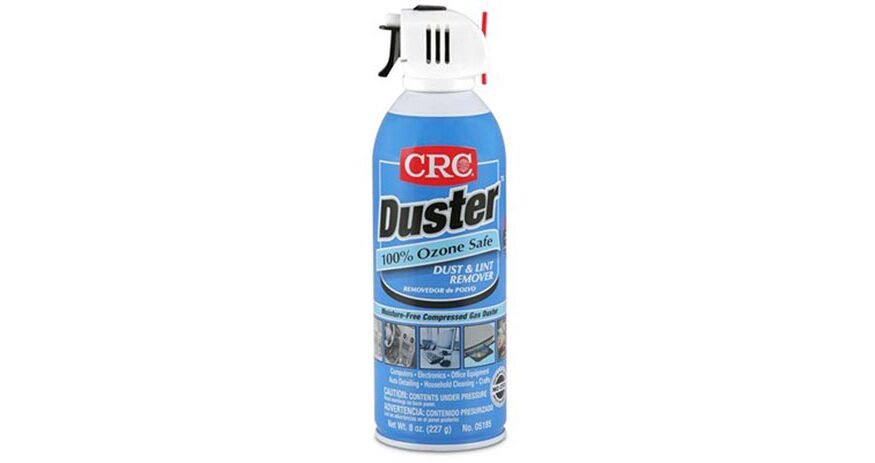U.S. judge denies summary judgment in crash caused by aerosol huffing
By: Laura Brown//September 7, 2023//
U.S. judge denies summary judgment in crash caused by aerosol huffing
By: Laura Brown//September 7, 2023//
A Minnesota woman was killed by a driver who had gotten high using a keyboard cleaning product. On Aug. 25, 2023, the U.S. District Court for the District of Minnesota denied the motion for summary judgment brought by the product’s manufacturer.
The lawsuit arose out of a car crash on July 22, 2019. Cynthia McDougall was driving her car on State Highway 172 in Baudette. Kyle Neumiller was driving his vehicle, crossed the center lane, drove into oncoming traffic, and collided with McDougall’s car head-on. McDougall was transferred to a local hospital with serious injuries and was pronounced dead.
After the crash, Minnesota State Patrol discovered a can of CRC Industries’ “Duster” product. Neumiller allegedly had huffed gas from a CRC canister while he was driving. This caused him to lose control of the vehicle and crash into McDougall’s vehicle.
CRC Industries is a Pennsylvania corporation that manufactures various chemical products. One of those products is CRC’s “Duster Dust and Lint Remover.” It is offered for sale at a variety of retailers, including home improvement, office supply and other stores. The product works by using compressed gas to blow lint and dust out of small areas that may otherwise be inaccessible to cleaning agents.
CRC “Duster” is a compressed gas product that is used to clean keyboards. It contains fluorinated hydrocarbon gas called 1,1-difluoroethane (DFE) that can also be found in hairspray and cleaning products. When inhaled, DFE can cause delusions, euphoria, and hallucinations. It is a central nervous system depressant that can also cause unconsciousness, drowsiness, and dizziness.
While Neumiller was not using “Duster” for its intended purpose, McDougall’s family — represented by attorneys at Robins Kaplan — argued that those who manufacture compress gas products such as “Duster” are aware that consumers have habitually gotten high by inhaling DFE from dust remover sprays. Plaintiffs alleged that CRC failed to deter or prevent people from inhaling their dust removers.
“Manufacturers, distributors, and sellers of dust removers … know that people inhale their dust removers to get high,” the complaint reads. “There have been numerous public reports of deaths and injuries to innocent bystanders caused by people driving while high on dust removers stretching back for at least twenty years. Every one of these injuries and deaths was preventable.”
Plaintiff’s complaint lists are variety of incidents in the past two decades across the country where someone inhaled dust remover, and either died from the gas or by causing a car accident. “Reports of dust remover abuse in the public domain are numerous and easily accessible, for example by a simple online search of widely available public media, like newspapers,” the complaint notes. The complaint also turned to pop culture as evidence that there is general awareness that people use the product to get high. It cited the 2003 movie Thirteen, where two teenagers are portrayed as getting high off of dust remover.
“Multiple safer, feasible alternative designs of CRC Duster were, have been, and are available to CRC Industries, yet, CRC Industries has marketed and sold, and continues to market and sell, CRC Duster, a defectively designed and unreasonably dangerous product,” plaintiffs argued in their complaint. In addition to damages, plaintiffs asked for the prohibition of the sale of dust removers containing DFE to minors, limitation the sale of dust remover to one per consumer every 30 days, and a prohibition on the design and manufacture of dust removers containing DFE “without an effective physical mechanism or chemical composition to deter inhalant abuse.”
Following court dismissal and voluntary withdrawal of some counts, McDougall had three remaining claims: strict liability for design defect, strict liability for failure to earn, and negligence. CRC brought a summary judgment motion for these claims; the court denied the motion, finding it “inappropriate.” The court found that there were genuine disputes of material fact as to the duty and proximate causation elements of McDougall’s claim.
CRC argued that did not owe a duty to McDougall and that its conduct did not create a foreseeable risk of injury. However, the court found that proving the duty element was “a close case” that must be decided by a jury. Besides the reported accidents stemming from inhalant abuse, the court noted that CRC was a member of the Alliance for Consumer Education (ACE). ACE has provided information about inhalant abuse. “Because CRC was affiliated with ACE, it is more likely that CRC knew or should have known about the prevalence of huffing while driving,” the court concluded.
Additionally, CRC asserted that the plaintiffs could not show that sale of the product was a proximate cause of the accident, claiming that Neumiller’s actions — of allegedly inhaling the product while driving and crashing into McDougall’s car — were an intervening cause. While the court asserted that CRC might convince a jury that its actions were not a proximate cause of McDougall’s death, the court found that a jury could reasonably infer that CRC’s actions were a substantial factor in McDougall’s demise.
“The Court’s denial of summary judgment is an important victory for the McDougall family,” said Tara Sutton, a partner at Robins Kaplan who represents the McDougall family. “The case will now proceed to trial, where we will show that CRC sold a lethal product without proper safeguards, which led to the premature death of our client, Cynthia McDougall, an innocent bystander, wife, and mother. This case will expose the terrible harms, that happen all too regularly, from the misuse of computer dusting spray.”
CRC and its attorneys did not respond for comment at the time of publication.
Legal News
- Former prosecutor suspended for unwelcome contact during legal conference
- One Wisconsin Attorney’s misconduct ‘in a league of its own’
- Wisconsin election fraud charge issued from November 2022 general election
- Indigenous consultant accuses NHL’s Blackhawks of fraud, sexual harassment
- Man pleads guilty in theft of Arnold Palmer green jacket, other Masters memorabilia from Augusta
- KS Governor cites competition concerns while vetoing measure for school gun-detection technology
- U.S. Attorney Gregory J. Haanstad recognizes service and sacrifice of federal, state, local, and Tribal law enforcement
- Gov. Evers calls special elections for the 4th Senate District and 8th Congressional District
- Wisconsin GOP-led Senate votes to override nine Evers vetoes in mostly symbolic action
- Bill to curb mask-wearing at protests could make it illegal for medical reasons too
- University board slashes diversity program funding to divert money to public safety resources
- Second defendant convicted in Fond du Lac 2016 firebombing
WLJ People
- Power 30 Personal Injury Attorneys – Russell Nicolet
- Power 30 Personal Injury Attorneys – Benjamin Nicolet
- Power 30 Personal Injury Attorneys – Dustin T. Woehl
- Power 30 Personal Injury Attorneys – Katherine Metzger
- Power 30 Personal Injury Attorneys – Joseph Ryan
- Power 30 Personal Injury Attorneys – James M. Ryan
- Power 30 Personal Injury Attorneys – Dana Wachs
- Power 30 Personal Injury Attorneys – Mark L. Thomsen
- Power 30 Personal Injury Attorneys – Matthew Lein
- Power 30 Personal Injury Attorneys – Jeffrey A. Pitman
- Power 30 Personal Injury Attorneys – William Pemberton
- Power 30 Personal Injury Attorneys – Howard S. Sicula













